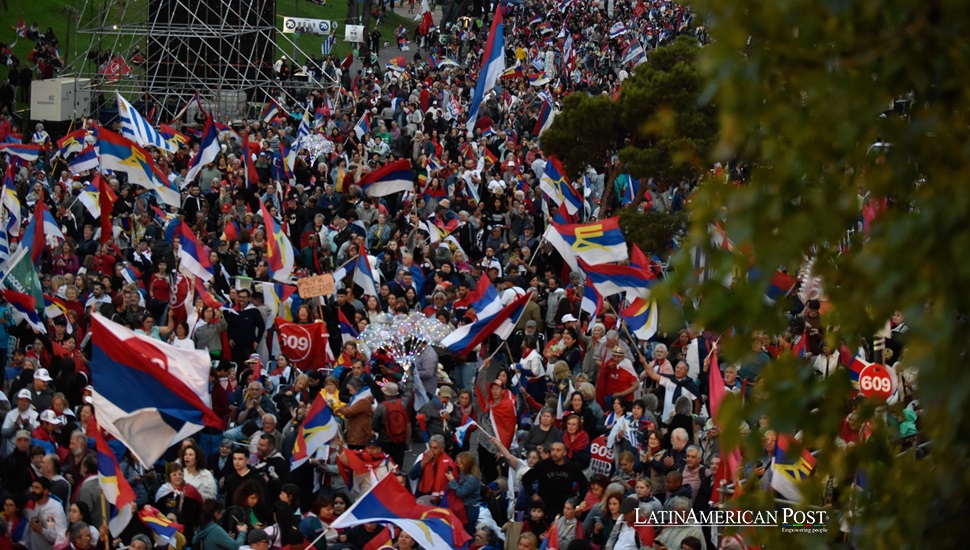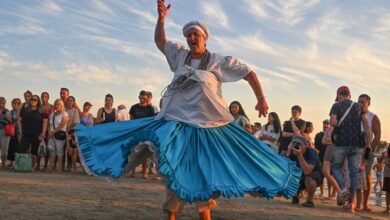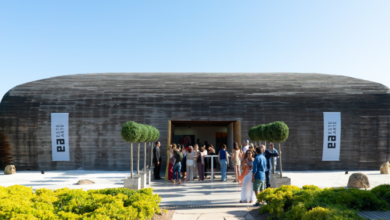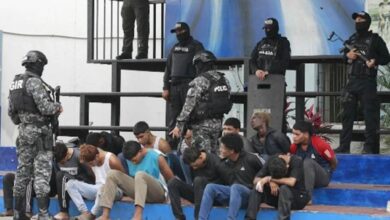Teacher, Vet, and Lawyer Battle for Uruguay’s Presidential Seat Facing Security Concerns

As Uruguayans head to the polls, a history teacher, a conservative vet, and a bodybuilding lawyer vie for the presidency in one of Latin America’s most stable democracies. Security, pension reform, and economic recovery from recent crises dominate the conversation.
A Diverse Lineup for Uruguay’s Presidency
Uruguay, known for its progressive policies and political stability, finds itself at a crucial moment as voters prepare to choose their next president. Three candidates have emerged as the leading contenders, each representing a vision for the future of the tiny nation of 3.4 million people.
Yamandú Orsi, a 57-year-old history professor from the center-left Frente Amplio (Broad Front), the political coalition that has brought significant reforms to the country over the past two decades, is leading the race. Orsi, a protégé of Uruguay’s former president José “Pepe” Mujica, runs on a platform emphasizing social welfare, education, and maintaining the country’s progressive values.
Challenging Orsi from the right is Álvaro Delgado, a 55-year-old veterinarian from the National Party, the party of outgoing President Luis Lacalle Pou. Delgado has centered his campaign on security and rural issues, positioning himself as a champion of conservative values and the protector of Uruguay’s agricultural heartland.
In third place is the wildcard candidate, Andrés Ojeda, a telegenic 40-year-old lawyer from the Colorado Party. Ojeda, a bodybuilding enthusiast and TV pundit, has brought a flamboyant energy to the race, drawing comparisons to Argentina’s libertarian president, Javier Milei. His campaign focused on law and order, has caught the attention of younger voters.
As the three candidates prepare for the election, their differing styles and policy priorities reflect the challenges and hopes of a country known for its stability but now grappling with new issues.
Key Issues Shaping the Election
Security is the top concern for voters in Uruguay, a country that has long prided itself on being an oasis of calm in a region plagued by violence. However, recent years have seen a surge in drug-related violence, putting the issue front and center in the presidential campaign.
While outgoing president Luis Lacalle Pou’s administration has made strides in reducing crime rates in certain areas—such as robberies and cattle rustling—violent crime, particularly murder, remains a severe problem. The candidates have each proposed different approaches to tackling this issue.
Drawing from the Frente Amplio’s social policies, Orsi has emphasized the need for long-term solutions that address the root causes of crime, including poverty and inequality. On the other hand, Delgado has focused on stricter security measures, appealing to rural voters by promising to strengthen law enforcement in Uruguay’s countryside. Ojeda has taken a more extreme stance, calling for a crackdown on drug trafficking and promoting more aggressive policing tactics.
In addition to security, the future of Uruguay’s pension system has become a critical issue in the campaign. A controversial proposal from the PIT-CNT union seeks to lower the minimum retirement age from 65 to 60 and ban private pension schemes. The candidates have all opposed the proposal, warning that it could further strain Uruguay’s economy, which is still recovering from the COVID-19 pandemic and a record drought in 2023.
Economists have warned that the PIT-CNT’s proposal could cost the government upwards of $460 million annually, with some estimates suggesting the actual cost could be twice that. With a fiscal deficit standing at 4.4% of GDP as of August, the candidates are treading carefully, aware that the country’s financial health is a crucial concern for voters.
A Nation in Transition
The three leading candidates offer Uruguayans a choice between continuity, change, and a touch of the unconventional.
Yamandú Orsi, the history professor, is campaigning as a man of the people. Born in the countryside to a family that lived without electricity, Orsi embodies the humble origins that many Uruguayans relate to. As a close ally of José Mujica, Orsi has promised to build on the social welfare policies of the Broad Front’s previous administrations. His supporters see him as a candidate who will continue to put the needs of ordinary Uruguayans first.
Álvaro Delgado, the veterinarian, represents the National Party’s bid to retain power. Known for his easygoing demeanor and strong connection to rural voters, Delgado’s campaign has focused on promoting the successes of the Lacalle Pou administration, particularly in reforming Uruguay’s labor laws and addressing public safety. However, he has faced some controversy, particularly after referring to his running mate, Valeria Ripoll, as a “hottie” during a public appearance—a comment for which he later apologized.
Andrés Ojeda, the lawyer, has taken a different approach, bringing a mix of showmanship and policy to the campaign. Ojeda, also a bodybuilding fanatic, has drawn comparisons to populist leaders like Argentina’s Javier Milei, particularly for his anti-establishment rhetoric. In one memorable campaign ad, Ojeda flexed his muscles in a gym while delivering a speech about the need to bring strength and discipline back to Uruguay’s political system. While his tactics have generated buzz, Ojeda remains an underdog in the race.
With no candidate expected to win outright in the first round, a runoff election between the top two contenders is likely. Polls suggest that Orsi and Delgado will advance to the second round, setting the stage for a battle between Uruguay’s left and right.
The Future of Progressive Uruguay
Uruguay has long been seen as a progressive leader in Latin America, known for its liberal policies on social issues and its commitment to environmental sustainability. Under successive governments, the country has legalized abortion, introduced same-sex marriage, and became the world’s first nation to allow recreational cannabis use. Additionally, Uruguay’s transition to renewable energy has been remarkable, with over 90% of the country’s electricity coming from renewable sources.
Despite these accomplishments, the next president will face the challenge of addressing the country’s growing concerns about crime and economic recovery while also preserving its reputation as a liberal bastion in the region.
Another critical issue in the election is a plebiscite on whether to allow police to carry out nighttime raids on homes to combat drug trafficking. This controversial proposal has divided the country, with many voters expected to reject it due to concerns over civil liberties. However, the debate over how best to tackle Uruguay’s crime problem is unlikely to go away, regardless of the outcome of the plebiscite.
The election has generated little excitement, a testament to Uruguay’s status as one of Latin America’s most stable democracies. As Benjamin Gedan, director of the Latin American Program at the Wilson Center, has pointed out, “There is simply no sense that there is much at stake.” In a country that has weathered political storms better than most neighbors, the 2024 election feels like a moment of calm—albeit one that could have long-term consequences for Uruguay’s future.
While the campaigns have primarily played out on social media, with little fanfare seen in neighboring countries, the stakes remain high for Uruguay. With an economy still reeling from the effects of the pandemic and the worst drought in the country’s history, the next president must navigate a delicate balance between maintaining the country’s progressive values and addressing its challenges.
Also read: Ecuador’s Noboa Should Focus on Governing, Not Reelection
The November runoff promises to be the next defining moment in this journey, as Uruguay’s voters weigh their desire for security and economic stability against their commitment to social justice and progressivism.





